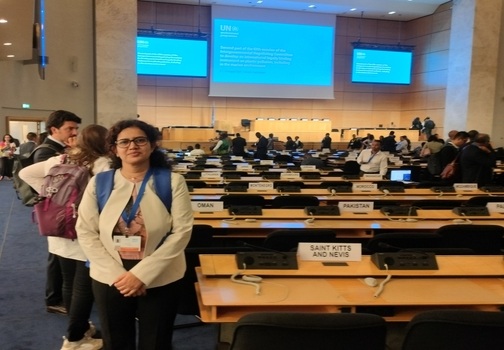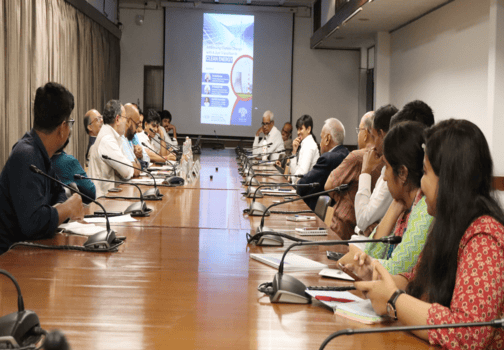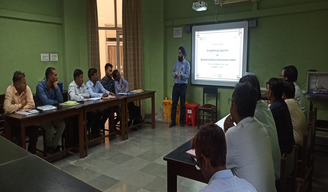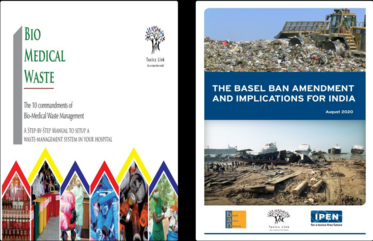Press Release
2026
Understanding Antibiotics Use
New Delhi, January 23, 2026: Antimicrobial resistance (AMR) occurs when microorganisms survive and multiply despite exposure to antimicrobial drugs designed to inhibit or kill them. The World Health Organisation warns drug-resistant diseases could cause 10 million deaths annually by 2050, worsening the treatment of HIV, tuberculosis, malaria, pneumonia and other illnesses, costing the economy up to US$412 billion (Lancet study, 2024).
Download | 23 Jan 2026
2025
Toxics Link found endocrine-disrupting chemical Nonylphenol Ethoxylates
New Delhi, May 19, 2025: Ever heard of Nonylphenol (NP) and Nonylphenol Ethoxylates(NPEs)? These are hormone-disrupting chemicals widely used across industries in the Asia Pacific region, and more so in India and China. Toxics Link, in its recent study, found the presence of Nonylphenol Ethoxylates in garments available across Indian offline and online marketplaces and also in different environmental matrices (surface water, sediment, and effluent samples) near major river systems around textile hubs of the country.
For English | For Hindi 19 May 2025
2024
Post-event Press Release-Quotes from the Earth 2024
New Delhi, December 6, 2024: The Ambassador of Norway to India, May-Elin Stener inaugurated the tenth biennial edition of environmental film festival ‘Quotes from the Earth’ at India International Centre (IIC), New Delhi today. Stressing on the excellent cooperation between India and Norway on bule economy and circular economy, she said India being a large country with high population has a critical role to play in achieving the global climate targets and Sustainable Development Goals (SDGs) and thus it is necessary for Norway to have close relationship with India. “Without India we cannot achieve the SDGs.”
Download| 6 Dec 2024
Pre-event Press Release-Quotes from the Earth 2024
New Delhi, November 27, 2024: The tenth biennial edition of one of the country’s oldest environmental film festivals, “Quotes from the Earth”, will be held at the India International Centre (IIC) on December 6-7, 2024. The two-day fest will take you through the fascinating world of wild animals, dwindling and thriving biodiversity, mounting waste management problems, climate emergency and the diligence and oblation of indigenous communities and women climate activists in preserving the beautiful bounty of the Earth.
Download|27 Nov 2024
Nonylphenol - An Endocrine Disrupting Chemical
New Delhi, October 17, 2024: Nonylphenol (NP) and Nonylphenol Ethoxylates (NPEs) are globally recognised as toxic chemicals and restricted for use by several countries. These are endocrine disrupting chemicals which are toxic to aquatic organisms and also interfere in reproduction, development and other physiological processes in humans and animals. The Central Pollution Control Board of India and the Bureau of Indian Standards, in individual reports, have both indicated the toxicity of NP and NPEs.
Download|17 Oct 2024
Microplastics in Salt and Sugar
New Delhi: In a first in India, Toxics Link conducted a study to test the presence of “microplastics” in “salt and sugar” and found that all Indian salt and sugar brands, small and big, packaged and unpackaged, sold both online and in local markets, contain microplastics. What was even more alarming was that a higher concentration of microplastics was found in “iodised salt” in the form of multicoloured thin fibres and films.
Download|13 Aug 2024
Toxic Household Waste: A Serious Threat
New Delhi: Do you know the humble nail polish bottle that you dispose along with your regular household wastes may spark a fire? Nail polish containers, paint drums, pesticide cans, CFL bulbs, expired medicines, broken mercury thermometers, used batteries and used needles and syringes are Domestic Hazardous Wastes (DHW) or Household Hazardous Wastes that have the potential to adversely impact both ecology and human health.
Download|9 July 2024
High Levels of Toxic Chemicals Detected in Everyday Receipts
New Delhi: The study titled “BPA in Thermal Paper: A Monitoring Study” reveals the presence of high concentration of Bisphenol-A (BPA) in thermal papers that are widely used in many applications, such as labels, tickets, medical charts, points of sale (POS) such as restaurants, kiosk, hotels, gas stations, supermarkets, and for labels, gaming, ticket & tags, etc.
Download|30 May 2024
Alarming levels of Antibiotic Resistance found in the poultry environment
New Delhi: A collaborative research report “Poultry’s pill problem;
Antibiotics and its environmental concern” released by Toxics Link and World Animal Protection found high levels of Antimicrobial Resistance Genes (ARG) in 11 out of 14 samples collected from poultry farms across the states of Tamil Nadu and Andhra Pradesh.
Download|16 Apr 2024
2023
Banned SUPs continue to flood the market in India (Mumbai)
Mumbai: A year after India’s ban on select single-use plastic products, a new study by Toxics Link titled “Single Use Plastic Ban in India” found widespread use of the restricted plastic products in five Indian cities: Delhi, Mumbai, Bengaluru, Guwahati, and Gwalior, especially in local stores and markets. Select single-use plastics (SUPs) were prohibited on July 1 of last year, however, it appears that a lot of that restriction has just been on paper. This clear infringement puts severe uncertainty on India’s efforts to reduce plastic pollution.
Download|10 Oct 2023
Banned SUPs continue to flood the market in India (Delhi)
Delhi: A year after India’s ban on select single-use plastic products, a new study by Toxics Link titled “Single Use Plastic Ban in India” found widespread use of the restricted plastic products in five Indian cities: Delhi, Mumbai, Bengaluru, Guwahati, and Gwalior, especially in local stores and markets. Select single-use plastics (SUPs) were prohibited on July 1 of last year, however, it appears that a lot of that restriction has just been on paper. This clear infringement puts severe uncertainty on India’s efforts to reduce plastic pollution.
Download|10 Oct 2023
2022
Environmental Film Festival “Quotes from the Earth”
December 1, 2022; New Delhi: ‘Quotes from the Earth’, an Environmental film festival organized by Toxics Link and India International Centre (IIC) opened today in the capital city of Delhi. The festival, supported by the Swedish Society for Nature Conservation and Friends Foundation International, was inaugurated by Shri Rahul Ram, a celebrated bass guitarist and lead vocalist for the rock-fusion band Indian Ocean, who is also known for his work as an environmentalist and social activist. The two-day festival will stimulate a dialogue on environmental struggles and concerns through films and panel discussion.
Download|1 Dec 2022
Sanitary Pads can be a health hazard!
New Delhi: A new study titled “Wrapped in Secrecy: Toxic Chemicals in Menstrual Products,” released by environmental NGO Toxics Link today, has revealed the presence of toxic chemicals, including Phthalates and VOCs, in organic and inorganic sanitary pads, sold in the Indian market. The study tested most of the major brands of sanitary pads, including organic and inorganic, available in the country, and detected these chemicals that can cause skin irritation, allergic reactions and can be endocrine disruptors for users. The report reveals new information on contaminants found in sanitary pads that can also cause cancer and release microplastic particles into the environment.
Download|21 Nov 2022
MICROFIBRES, THE THREADS OF PLASTIC POLLUTION
New Delhi: Synthetic clothing is a huge contributor to microfibre pollution, reports a new study titled “Dirty Laundry: Threads of Pollution – Microfibres” released today by an environmental group, Toxics Link. The new report, which has looked at global studies across the globe, highlights that 124 to 308 mg of microfibres is released per kg of washed fabric during washing, depending on the type of washed garment.
Download|04 Aug 2022
Toxic Chemical “Nonylphenol” A Barrier to Safe Drinking Water
New Delhi, June 28, 2022:A new study by Toxics Link, released today, titled ‘Toxic Chemical “Nonylphenol”: A Barrier to Safe Drinking Water’ has raised concerns over high levels i.e., 29.1 to 80.5 ppb (parts per billion) of‘Nonylphenol’, a toxic chemical detectedin drinking water samples across India. In this study, fifteen drinking water samples were collected from different parts of the country and sent to the Shriram Institute of Industrial Research, New Delhi for testing. The highest concentration was observed in a borewell water sample from Bathinda (80.5 ppb). “Nonylphenol is a toxic chemical and a well-known endocrine disruptor associated with a number of adverse effects on human health. Daily intake of Nonylphenol through drinking water can have adverse health impacts on citizens”, said Piyush Mohapatra, Senior Programme Coordinator, Toxics Link.
Download|28 Jun 2022
Microplastics are polluting our oceans also contaminating our soil
New Delhi: A first of its kind assessment titled “Plastic Mulching: Microplastics in Agricultural Soils,”released by environmental NGO Toxics Link today, has found a high abundance of microplastics in the soilsamples that have been using plastic mulch sheets. The usage of plastic film in mulching is a recentdevelopment globally, and in India, it has been practiced only for a few decades. Mulching is a practice ofcovering the soil to retain the soil temperature and moisture to facilitate higher crop production. The study,which tested soil in some agricultural belts in Karnataka and Maharashtra, shockingly, found tiny plasticparticles at various depths, indicating soil contamination due to the rampant use of plastic mulch sheets.Recent studies have found that microplastics are not only fatal to the human environment but have alsofound their way into the human blood and lungs.
Download|05 May 2022
Toxicity at the end of light
New Delhi, 7, April, 2022: Mercury lamps continue to harm the environment and human health, claims a new study by New Delhi based environmental group, Toxics Link. The report titled The End of Light – Waste Generated by Mercury-Bearing Lamps’ by Toxics Link found that cities in India lack a take-back mechanism for CFLs and Fluorescent lamps (FTLs), and the discarded hazardous lamps end up in landfills or inappropriately recycled by the informal sector, thus releasing mercury into our environment.
Download|07 Apr 2022
presence of microbeads in cosmetic products in India
New Delhi, 24, March, 2022: A new study titled ‘Dirty Cleanser: Assessment of Microplastics in Cosmetics’, released by Delhi-based NGO Toxics Link, shows that shockingly large number of personal care cosmetic products (PCCPs) in India — including some of the leading brands — contain harmful microplastics. The 52-page study, based on the assessment of 35 PCCPs, underscores the disturbing fact that microbeads released from items of daily use, pose a serious threat to the environment, particularly the marine ecosystem.
Download|24 Mar 2022
Antibiotic Pollution in Rivers
New Delhi, February 24, 2022: A new Toxics Link study, released today, titled ‘Menace of Antibiotic Pollution in Indian Rivers’ has raised serious concerns over antibiotic residues found in river water samples across India. Antibiotics are important life-saving medicines and play a key role in the wellbeing of human health. However, indiscriminate use and lack of regulatory standards for antibiotics in effluents from pharmaceutical industries are contributing to the rise of antibiotic pollution in rivers. This rising trend of antibiotic pollution poses serious threat to ecology and human health which can have far reaching consequences such as the development of Antimicrobial Resistance (AMR). “India being one of the major users and producers of antibiotics in the world is more prone to the ill effects of antibiotic pollution”, said Piyush Mohapatra, Senior Programme Coordinator, Toxics Link.
Download|25 Feb 2022
2021
Sale of illegal mercury-laced skin whitening creams in India
Delhi, November 11, 2021: Dangerously high levels of mercury, a heavy metal and neurotoxin, were found in imported skin whitening creams being sold in Indian markets as reported by Toxics Link in its latest report “Dark truth of skin whitening creams: Presence of Mercury in skin whitening creams”.According to the WHO, mercury is hazardous to health and has the potential to cause damage to the central nervous system, the gastrointestinal system and the kidneys. The UNEP has also shown concern over the fact that mercury bio-accumulates in the body tissue and its long-term exposure can have impact to the brain, heart, kidneys, lungs and immune system particularly, in unborn children and babies. In the present report, 15 skin whitening creams of different brands manufactured in India, Pakistan and Philippines were enlisted. These samples were collected from different cities of India, i.e., Mumbai, Vijayawada, Delhi and Trivandrum and tested in Shriram Institute for Industrial Research, New Delhi using Inductively Coupled Plasma-Mass Spectrometry (ICP-MS) by a standardized method.
Download|11 Nov 2021
Clean drinking water: A pipe dream?
Panjim, August 11, 2021: The residents of Goa might be consuming plastics along with drinking water, reports a new study by Delhi-based advocacy group Toxics Link. The study titled ‘Clean Drinking Water: A pipe dream?’, assessing microplastics in tap water in Goa, released today, reveals that the drinking water supplied to Goan homes is contaminated with plastics. The study, which assessed tap water from Margao, Panjim,Mapusa, Marcel and Canacona and the water treatment plants in Goa found Microplastic particles in all the water samples and raises concern over increasing microplastic contamination of our water bodies.
Download|11 Aug 2021
Ganga waters polluted with plastics and microplastics, study finds
A new study titled, ‘Quantitative analysis of Microplastics along River Ganga’ released by Delhi-based NGO Toxics Link today finds that the river is heavily polluted with microplastics. The findings reveal the presence of microplastics in all samples collected from the river at Haridwar, Kanpur and Varanasi. The river waters were found to be polluted with multiple kinds of plastic, the highest concentration being found at Varanasi, comprising of single-use and secondary plastic products. Microplastics are defined as plastics less than 5 mm in length and recognized as a major source of marine pollution of significant concern, due to their persistence, ubiquity and toxic potential. Untreated sewage from many cities along the river’s course, industrial waste and religious offerings wrapped in non-degradable plastics add large amounts of pollutants to the river as it flows through many cities that are densely populated. The plastic products and waste materials released or dumped in the river break down and are eventually reduced to Micro particles and the river finally transports significantly large quantities downstream into the ocean which is the ultimate sink of all plastics being used by humans. “Essentially all along microplastics are flowing into the river system. It does reflect or suggest a direct linkage between the poor state of both solid and liquid waste management; hence it is critically important to initiate steps to remediate it, said Priti Mahesh, Chief Coordinator at Toxics Link.
Download|22 Jul 2021
गंगा का पानी प्लास्टिक और माइक्रोप्लास्टिक से प्रदूषित, अध्ययन में पता चला
दिल्ली स्थित एनजीओ टॉक्सिक्स लिंक द्वारा जारी ‘गंगा नदी के किनारे माइक्रोप्लास्टिक्स का मात्रात्मक विश्लेषण’ नामक एक नए अध्ययन में आज पाया गया कि नदी माइक्रोप्लास्टिक से बहुत अधिक गंदी हो गई है। इस अध्ययन के परिणामों से हरिद्वार, कानपुर और वाराणसी में नदी से लिए गए सभी नमूनों में माइक्रोप्लास्टिक पाया गया है। यह पाया गया है कि नदी का पानी कई प्रकार के प्लास्टिक से गंदी हो गई है, जिसमें एक बार इस्तेमाल होने वाले और प्लास्टिक से बनने वाले सेकेंडरी उत्पाद शामिल हैं, इसकी सबसे अधिक मात्रा वाराणसी में पाई गई है। नदी के किनारे कई शहरों से गैर-शोधित सीवेज, औद्योगिक कचरे और बिना गलने वाले प्लास्टिक में लिपटे धार्मिक प्रसाद से नदी में भारी मात्रा में प्रदूषक मिल रहे हैं क्योंकि यह ऐसे कई शहरों से होकर बहती है जो घनी आबादी वाले हैं। प्लास्टिक उत्पादों और कचरे को नदी में छोड़ दिया या फेंक दिया जाता है और जो आखिरकार छोटे-छोटे टुकड़ों में बदल जाते हैं और नदी अंततः बड़ी मात्रा में इन कचरों को नीचे समुद्र में ले जाती है जो मनुष्यों द्वारा उपयोग किए जा रहे सभी प्लास्टिक का अंतिम सिंक है।टॉक्सिक्स लिंक की मुख्य समन्वयक प्रीति महेश ने कहा कि “निश्चित तौर पर सभी माइक्रोप्लास्टिक नदी में बह रहे हैं। यह ठोस और तरल कचरा प्रबंधन दोनों की खराब स्थिति के बीच सीधे संबंध को दर्शाता या बताता है, इसलिए इसे ठीक करने के लिए कदम उठाना जरूरी है।
Download|22 Jul 2021
Don't dump that: An overview of Biomedical waste management in Gujarat
A new study titled, ‘Quantitative analysis of Microplastics along River Ganga’ released by Delhi-based NGO Toxics Link today finds that the river is heavily polluted with microplastics. The findings reveal the presence of microplastics in all samples collected from the river at Haridwar, Kanpur and Varanasi. The river waters were found to be polluted with multiple kinds of plastic, the highest concentration being found at Varanasi, comprising of single-use and secondary plastic products. Microplastics are defined as plastics less than 5 mm in length and recognized as a major source of marine pollution of significant concern, due to their persistence, ubiquity and toxic potential. Untreated sewage from many cities along the river’s course, industrial waste and religious offerings wrapped in non-degradable plastics add large amounts of pollutants to the river as it flows through many cities that are densely populated. The plastic products and waste materials released or dumped in the river break down and are eventually reduced to Micro particles and the river finally transports significantly large quantities downstream into the ocean which is the ultimate sink of all plastics being used by humans. “Essentially all along microplastics are flowing into the river system. It does reflect or suggest a direct linkage between the poor state of both solid and liquid waste management; hence it is critically important to initiate steps to remediate it, said Priti Mahesh, Chief Coordinator at Toxics Link.
Download|15 Jul 2021
Menstrual waste creating plastic mounts!
New Delhi, June 3, 2021: 12.3 billion or 113,000 tonnes of used sanitary pads are dumped in landfills in India every year, adding to the already existing plastic pollution in the country, shares a new study titled ‘Menstrual Products and their Disposal’ released by the environmental group Toxics Link in New Delhi today. The study has also raised serious concerns on improper disposal methods and non-segregation of menstrual waste from household waste, which leads to unhygienic working conditions for waste workers, and posing the risk of infectious diseases among them.
Download|03 Jun 2021
2020
Mother’s beware! Your baby’s nappy is laden with toxic chemicals!
New Delhi, September 28, 2020: If you are a doting as well as a discerning parent with a baby or toddler this is for you! A new study titled, ‘What’s in the Diaper: Presence of Phthalates in Baby Diapers’ released by Delhi-based advocacy organisation Toxics Link raises concern over toxic phthalates being found in disposable baby nappies that are available in the Indian market. Phthalates are endocrine disrupting chemicals (EDCs) and exposure to them is known to cause serious health impairments.
Download|28 Sep 2020
माताएँ सावधान हो जाएँ! आपके बच्चों के नैपीज़ विषाक्त रसायनों से दूषित हैं!
नई दिल्ली, सितंबर 28, 2020:यदि आपके घर में शिशु या छोटा बच्चा है जो अभी चलना सीख रहा है जिसे आप बहुत प्यार करती हैं और समझदारी से देखभाल करती हैं, तो यह समाचार खास आप के लिए है! दिल्ली स्थित संगठन ‘टॉक्सिक्स लिंक’द्वारा जारी, ‘व्हाट्स इन द डायपर: प्रेसेंस ऑफ थैलेट्स इन बेबी डायपर्स‘शीर्षक के नवीन अध्ययन मेंभारतीय बाजार में उपलब्ध डिस्पोजेबल बेबी नैपीज़ में विषैले थैलेट पाए जाने पर चिंता व्यक्त की गई है। थैलेट, अंतःस्त्रावी रसायनों की कार्यप्रणाली में व्यवधान उत्पन्न कर स्वास्थ्य को गंभीर हानि पहुँचाते हैं।
Download|28 Sep 2020
Non-woven ‘cloth’ bags are nothing but plastic!
New Delhi, September 10, 2020: A new study titled ‘Environmental illusion The non-woven bag’ released by Delhi-based advocacy organisation Toxics Link today, busts the myth that non-woven bags are an eco-friendly alternative to plastic bags and reveals that they are nothing but polypropylene (a form of plastic) thereby emphasising the need for informing and educating the consumers regarding their reality. The study results indicate that 88% of the respondents have replaced plastic bags with alternatives while 45% have replaced plastic bags with non-woven bags. Ironically all markets where single-use plastic is banned are being swamped with these NW bags creating a huge confusion in the perception of consumers.
Download|10 Sep 2020
Lead containing paints available in Indian market a risk to children-TamilNadu
In alignment with the global plan of action to eliminate Lead from paints, the Government of India notified the Regulation on Lead Contents in Household and Decorative Paint Rules in 2016 which came into effect from 1st November, 2017.
Download|18 Jun 2020
Lead containing paints available in Indian market a risk to children - Rajasthan
“Lead in paints is one of the common sources of Lead poisoning amongst children. Children are the most susceptible to lead poisoning as lead can cause irreversible damage to the nervous system. So global efforts have been mooted by WHO and UNEP to phase out lead from products including paints” said Piyush Mohapatra, Senior Program Coordinator at Toxics Link.
Download|18 Jun 2020
Lead containing paints available in Indian market a risk to children - MP
Lead (Pb) is a cumulative toxicant that poses serious risks to the environment besides human health and lead exposure has been identified by The World Health Organization as one of the top ten environmental health threats globally.
Download|18 Jun 2020
Lead containing paints available in Indian market a risk to children - GOA
When Lead accumulates in the body it can damage almost all organ systems and young children and pregnant women are at highest risk. It is mostly ingested by toddlers by the commonplace practice of licking doors and windows or eating dried paints.
Download|18 Jun 2020
Lead containing paints available in Indian market a risk to children - DELHI
June 18, 2020: A new study titled ‘How safe is your paint?’ released by the environmental NGO Toxics Link raises concern on the availability of Lead containing paints across India and lack of compliance to the existing regulations in most cases.It is a well-known fact that no safe level of exposure to Lead has so far been identified.
Download|18 Jun 2020
Goa film festival press release
Creating environmental awareness through films! February 20, 2020:A one-and-a-half-day eco film festival by environmental research and advocacy group Toxics Link with support from The Swedish Society For Nature Conservation will be held in Panaji on February 22 and February 23.Toxics Link( www.toxicslink.org),is a non-profit organization based in Delhi working on environmental issues related to waste and chemicals for over the last two decades and has credible representations at public and private forums and discussions. Toxics Link in collaboration with India International Centre, has been jointly organising a biennial environmental film festival called ‘Quotes from the Earth’ in Delhi since 2004 and the eighth edition of the festival was held in 2018.The eco film fest with a visual tapestry of films showcasing critical environmental issues on diverse topics like water, sustainability, biodiversity, forest conservation, waste etc is being organised for the first time by Toxics Link in Goa.
Download|20 Feb 2020
Consumers in favour of a ban on Single Use Plastic
New Delhi, Feb 19, 2020:A new study titled ‘Single Use Plastic-The Last Straw’ released by the environmental group Toxics Link in New Delhi today, reveals that consumers in India recognize the environmental impact of disposable plastic products and want a ban on many single use plastics in the country.The results highlight growing public awareness of the problem of single use plastic waste in the country. Single use plastic has been identified globally as one of the key contributors to marine pollution and the most found items in global beach cleanups. By 2025, it is estimated that the ocean will contain one ton of plastic for every three tons of fish; and by 2050, it will have more plastics than fish.
Download|19 Feb 2020






